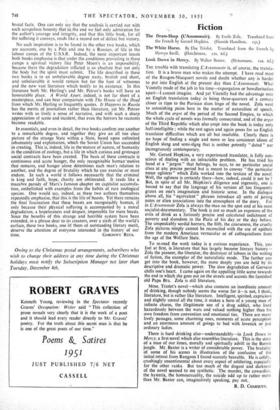Fiction
The Dram-Shop (L'Assommoir). By Emile Zola. Translated from
the French by Gerard. Hopkins. (Hamish Hamilton. 'Es.)
The White Horse. By Elsa Triolet. Translated from the French by Mervyn Savill. (Hutchinson. t as. 6d.) Look Down in Mercy. By Walter Baxter. (Heinemann. tos. 6d.) Tim trouble with translating L'Assommoir is, of course, the transla- tion. It is a brave man who makes the attempt. I have read most of the Rougon-Macquart novels and doubt whether any is harder to put into English at the present day than L'Assommoir. What Vizetelly made of the job in his time—expurgation or bowdlerisation apart—I cannot imagine. And yet Vizetelly had the advantage over an English translation today in being three-quarters of a century closer in tiqie to the Parisian slum lingo of the novel. Zola went to astonishing pains here in the matter of naturalism of speech. Much of the argot of the period of the Second Empire, to which the whole cycle of novels was formally consecrated, and of the argot of the Third Republic which also crept into the book is today only half-intelligible ; while the rest again and again poses for an English translator difficulties which are all but insoluble. Clearly there is no hope of finding a single and more or less consistent idiom of English slang and semi-slang that is neither potently "dated" " nor incongruously contemporary.
Mr. Gerard Hopkins, a very experienced translator, is fully con- scious of dealing with an intractable problem. He has tried his hand at a " jargon " that belongs, he says, to no particular social class at any precise period but is meant to convey the particular mean ugliness " which Zola worked into the texture of the novel. Well, the ugliness is certainly there—how, indeed, could it not be ? But, in spite of all Mr. Hopkins's diligence and ingenuity, one is bound to say that the language of his version all too frequently grates on one's imagination and historic sense. In the dialogue above all, his " equivalent " phrases introduce all sorts of jarring notes or alien associations into the atmosphere of the story. For in L'Assommoir Zola is always the man on the spot and at his most socialist-documentary. The book is not so much an exposure of the evils of drink as a furiously precise and calculated indictment of poverty and slumdom in the Paris of his day, or the day before. The unspeakably sordid horrors, the filth, the coarseness, the cruelty Zola pictures simply cannot be reconciled with the use of epithets from the modern American vernacular or of colloquialisms from the age of the Welfare State.
To re-read the work today is a curious experience. This, you feel at first, is literature that has largely become literary history— Zola the pioneer, the liberator, the destroyer of taboos in the writing of fiction, the exemplar of the naturalistic mode. The farther you get into the book, however, the more deeply you are held by its descriptive and dramatic power. The slow degradation of Gervaise chills one's heart. I came-again on the appalling little scene towards the end in which she goes out on the streets and accosts the famished old Papa Bru. Zola is still literature.
Mme. Triolet's novel—which also contains an inordinate amount of drinking, though nobody seems the worse for it—is not, I think, literature, but is rather like literature. Intelligent, spirited, capricious and slightly unreal all the time, it makes a hero of a young man of infinite charm, the illegitimate son of a drug addict, who lived hazardously between the wars and valued nothing higher than his own freedom from convention and emotional ties. There are many lively passages, some charming ones, moments of acute perception and an enormous amount of goings to bed with lovesick or just ordinary ladies.
There is hard drinking also—understandably—in Look Down in Mercy, a first-novel which also resembles literature. This is the story of a man of our times, morally and spiritually adrift in the Burma jungle. Mr. Baxter is a writer of considerable power. The brutality of some of his scenes in illustration of the confusion of the initial retreat from Rangoon I found scarcely bearable. He is coldly, crushingly unsentimental about every aspect of soldiering, especially for the other ranks. But too much of the disgust and darkness of the novel seemed to me synthetic. The murder, the cowardice, the hysteria, the homosexuality, the suicide add up to rather more than Mr. Baxter can, imaginatively speaking, pay out., R. D. CHARQUES.


































 Previous page
Previous page